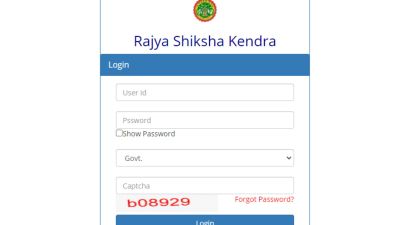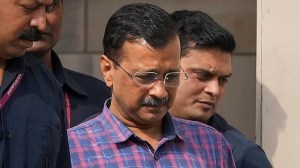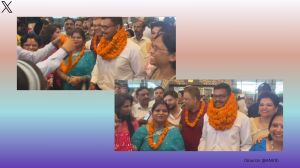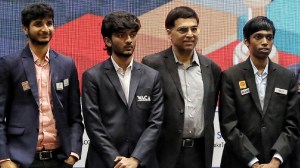- India
- International
At Delhi’s World Class Skill Centre, English, quota top concerns
As the Delhi govt plans 25 more such centres, the centre’s teachers say changing nature of education has necessitated the need for institutions like theirs
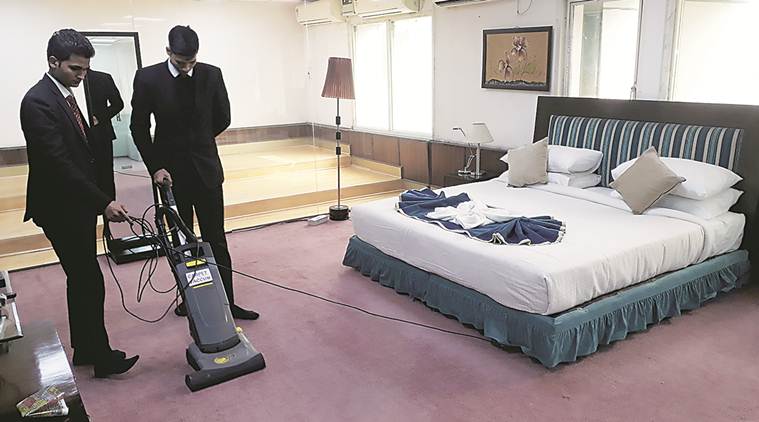 Students clean a training room that resembles a hotel suite. (Express photo by Amitava Chakraborty)
Students clean a training room that resembles a hotel suite. (Express photo by Amitava Chakraborty)
It is 10.30 am. In the lawns outside, two youth in their early 20s are dealing with applicants who have queued up at the World Class Skill Centre (WCSC) in Delhi’s Vivek Vihar to submit their admission forms.
On January 11, Delhi Deputy Chief Minister Manish Sisodia announced the setting up of six new skill centres in the city, starting March, and said by August, it hopes to have 19 more functional.
While the country debates jobs and the Centre promises skill centres, the Vivek Vihar WCSC set up in 2013 is among the first created to address the shortage of skilled manpower in Delhi.
It currently runs four one-year courses — Hospitality Operations, Retail Services, Digital Marketing and Web Development, and Finance Executive. Established following a memorandum of understanding (MoU) between the Sheila Dikshit-led Delhi government and the government of Singapore in July 2012, it has 960 seats across the four courses, and received approximately 2,000 applications in 2018.
“This WCSC is funded by the Delhi government and administered by the Directorate of Training and Technical Education. The Institute of Technical Education (a leading public vocational institution in Singapore) helped us shape the infrastructure, and set up modern laboratories and classes. They continue to provide technical assistance and help in framing the curriculum,” says Vice-Principal Umang Jain.

In the WCSC, there are model laboratories resembling bedrooms, toilets and laundry rooms in hotels, and shops in malls. ‘Master trainer’ (as senior teachers are referred to) of Hospitality Pawan Singh says, “The infrastructure at the WCSC is better than many of its peers.”
Students regularly find paid internships at top private companies, claims Gargi Dutta, Head, Hospitality Operations.
Around mid-day, facing 10 anxious students in a room on the first floor of the three-storey building, ‘Master Trainer’ of Digital Marketing, Anita Mahajan, says, “Keep calm. Don’t worry about anything else.” The students are going up next before a panel of a private IT company, which is conducting interviews in the next room.
Soon, a beaming Samriddhi Sharma emerges from the room. After completing her B.Com from Delhi University, the 21-year-old joined the WCSC. “I am interested in web designing and digital marketing. I have created two websites — on ‘fashion’ and ‘skills of good living’. The interviewers were impressed,” Sharma grins, before heading to Mahajan to update her.
As much as 70 per cent of the curriculum is based on practical or lab sessions, which include activities such as role play. Theory accounts for the rest. “Students have classes for eight hours a day, of which they spend about five hours in labs,” says Dutta.
One training room that she oversees resembles a suite in a hotel. There, a youth is making a bed, two others are vacuuming the floor and cleaning the almirahs. The toilet is being scrubbed by another person.
Standing behind high tables that look like a bar counter in the next practical room, Akhil Singh (20) is teaching his friends how to make mocktails. He is excited about interning with entertainment and leisure park Kingdom of Dreams in Gurgaon from this month.
Neeru Kalher, a teacher in the Retail Services department, says it is the changing
nature of education that has necessitated the need for institutions like the WCSC. “We don’t just have students who have passed Class 12. There are also graduates. Almost all the students get placed. The normal package is between Rs 2.6 lakh and Rs 5.3 lakh per annum. This one-year course also doesn’t hinder students’ graduate studies.”
Around 4 pm, Finance Executive students assemble for their last lecture of the day. Saroj Mishra teaches the class volatility in the agriculture market using the characters of a farmer, a middleman and a hotelier, who own properties next to a mandi.
As the day nears its end, the crowd in front of Kiran Kumar and Mohammed Waseem’s desk has depleted.
Kumar, 20, who is studying Hospitality Operations and is currently manning the help desk, worries about those who don’t know English. “It is mandatory for all to have passed Class 12 examinations with English as a subject. Many who come are disheartened hearing this,” Kumar says.
Kumar’s course mate Mohammed Waseem (22) says they have been fielding questions lately on the status of reservation following the 10 per cent quota for economically weaker section in general category. “Often students turn up without the requisite certificates. Many are not aware either that a fresh report has to be obtained against their OBC certificate every year, that excludes them from the creamy layer,” he says.
“For now, the 10 per cent rule is not applicable to us,” clarifies Satish Kumar Verma, the project coordinator for the WCSC. They are waiting for instructions from the Delhi government, he adds.
Must Read
Apr 23: Latest News
- 01
- 02
- 03
- 04
- 05











